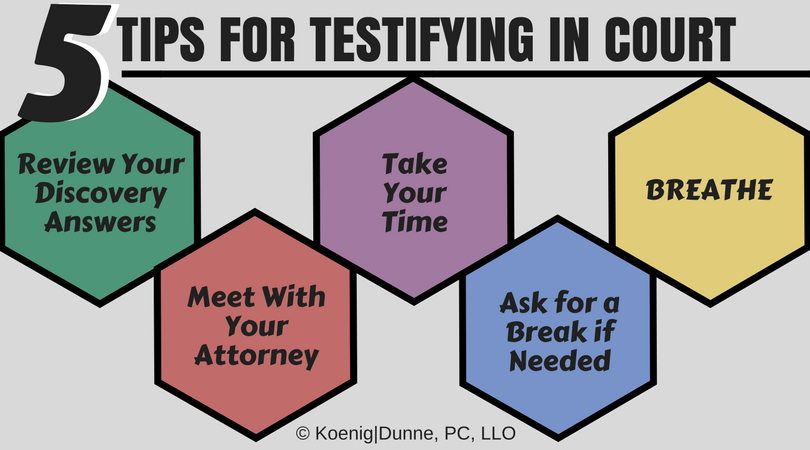There may be times during your divorce when you are asked to testify in the courtroom. “Testify” means to answer questions under oath. Before you testify in open court, you will be sworn in as a witness, meaning you swear (or affirm) to tell the truth.
The thought of being on the witness stand and answering questions from your attorney and opposing counsel can be anxiety-provoking. You may be afraid of giving the wrong answer or of saying something that you believe will harm your case. You may be leery of opposing counsel and assume he or she is intentionally trying to trip you up.
If you know you will be testifying, follow these tips for the best experience:
- Review your discovery answers. During the discovery process, you may have answered questions, in writing or at a deposition, under oath. If you answered interrogatories or were deposed, ask your attorney for copies of your answers to interrogatories and your deposition transcript. Refreshing yourself with your answers will help you prepare for the types of questions you can expect to be asked on the witness stand. If you answer differently at the time of trial than how you answered during the discovery process, you will want to be able to explain why.
- Meet with your attorney. Your attorney has likely practiced in the same courtroom where you’ll be testifying. He or she has likely been in front of the same judge. Rely on your attorney’s experience. Ask any questions that that will relieve your anxiety, for example, how you should dress or what (if anything) you should bring. Ask who else may be in the courtroom. Ask about the set-up of the courtroom.
- Take your time. When you’re on the stand, you want to give the best testimony you can. Do not feel rushed. If you don’t understand the question being asked, simply say so. If you don’t know the answer, don’t try to guess. When your attorney is asking you questions, focus on him or her. Regardless of who is asking you questions, remember that you are under oath and have promised to tell the truth.
- Ask for a break if needed. Testifying can be overwhelming and exhausting. If you feel like you need a break, politely ask for one. Sometimes getting up and walking around for a few minutes can be reenergizing. If you would like a cup of water while your testifying or need tissues, have your attorney ask the judge for permission.
- Breathe. Nobody wants to be in open court spilling intimate details about their lives. You may be asked questions that are upsetting. You may be asked questions that require you to be vulnerable. Remember to breathe. When you are on the stand, it is your opportunity to tell the judge your story. Be brave, breathe, and allow your attorney to support you.
Your Koenig│Dunne family law attorneys are experienced litigators who know the ins and outs of the courtroom. We have the expertise to prepare you for what may be the most difficult day of your life. Our goal is to ensure you feel supported, especially when you are called to testify.

